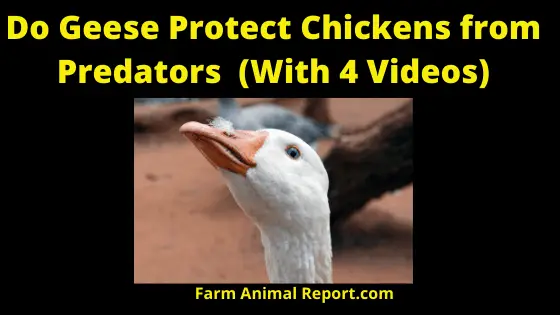As a general rule Geese can make excellent guardians for a flock of smaller birds, where their temperamental reputation comes in handy. Naturally territorial, geese fit easily into the role of watchdog and don’t need any training in how to protect. The guardian goose may hiss, spread its wings in a large display, or outright attack an unwanted guest if it feels the need to do so. They may become physically combative with skunks, raccoons, snakes, hawks, rodents, and weasels, but do not engage in physical altercations against a larger game like bobcats, pumas, or coyotes.
Will Geese Protect Chickens from Hawks?
However, they will at the very least sound their signal which alerts the farmer and the flock to potential trouble. These behaviors make them an attractive natural and low-cost solution to farmers and homesteaders for chicken or duck protection. But before opting to employ a goose to stand guard over the flock there are first a few key points to consider. Will Geese Protect Chickens from Hawks?
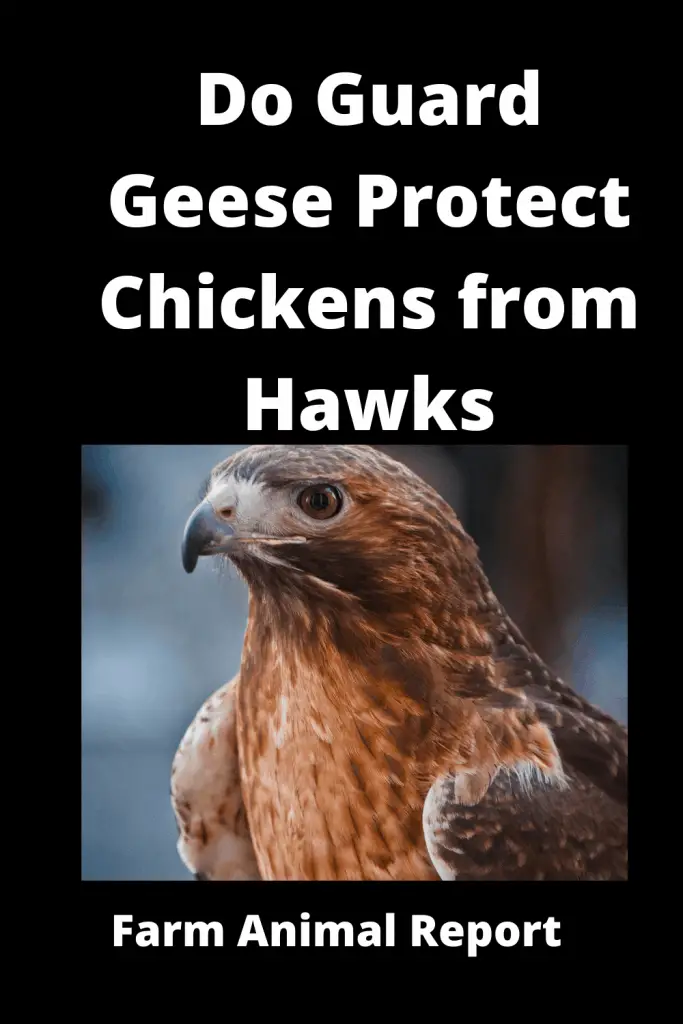
Guard Geese are territorial and can help protect your flock of chickens. They can fight off smaller predators such as skunks, weasels, and other rodents. They cannot fight against larger predators such as Coyotes, large cats, or raccoons.
12 Ways to Make Money by Chicken Farming—Extensive Guidelines for Chicken Farmers
They can make a lot of noise and sound a warning when a predator is near. They will also warn against eagles, hawks, and other flying predators. Keep in mind that if you have more than one goose, they may be less protective of a chicken but they will still sound a warning and protect themselves and other geese.
Do Guard Geese Protect Chickens from Hawks / The Role of the Guardian Goose
We can’t help but cuddle and hand-feed our ducklings and baby chicks. We strive to earn their trust and often treat them as family pets. However, raising a large bird to serve as a watchdog requires a different approach. Because geese operate on a hierarchical system it is important that farmers and flock owners establish themselves as the dominant figure early.
See Our – 12 Ways to Make Money by Geese Farming—Extensive Guidelines for Geese Farmers
It is crucial the goose is not hand-fed, held, or coddled as these actions deteriorate the boundary between human and goose. The goose will often become too comfortable with the flock owner, lose respect, and ultimately see the individual as a mere flock mate.
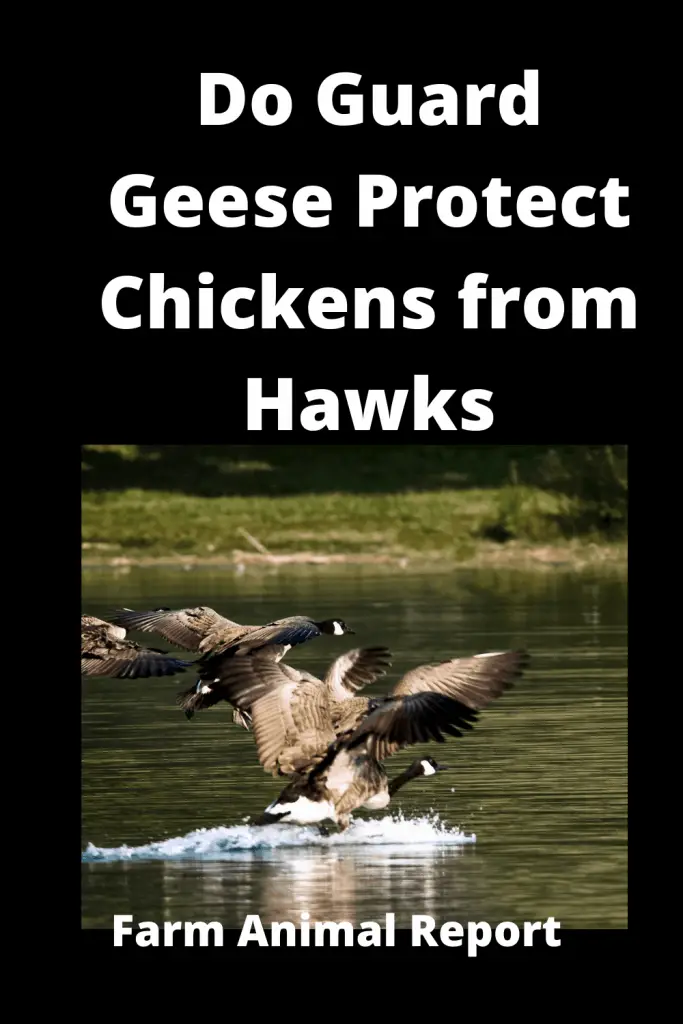
The adult goose may try to dominate through aggressive actions such as hissing, biting, or displaying a snaking motion of the neck. Rather than coddle the young goose and bond through hand-feeding and holding, establish a positive but respectful relationship with a gosling through providing clean feed and water, sanitary living quarters, and keeping the goose in good health.
See Amazons Educational Resources on Poultry Predators
Primer Of Livestock Guardian Animals
It is strongly suggested to refrain from treating the goose as a family pet; rather it is important to treat them as simply geese.
Which Goose Breed is Right for You?
Most any domestic geese breed naturally possesses a watchdog mentality and a safeguarding instinct. It is simply in their nature to watch over themselves, their flock mates, nests, and territory. But certainly, some domestic geese breeds are more loud or assertive than others.
As with any animal species, breeds and individual personalities may vary and should serve as a general guide to finding the right guardian domestic geese breed for your backyard poultry flock. Most breeds of geese have the attitude for guarding, but if you’re getting a dedicated guard goose look no further than a Chinese or African goose.
The loudest geese breeds, Chinese, and Africans are also larger than a lot of other varieties, which makes them extra intimidating. Also, an effective guardian is the Roman Tufted, a loud but small breed, and plenty of mixed breeds will make good watchdogs, as well.
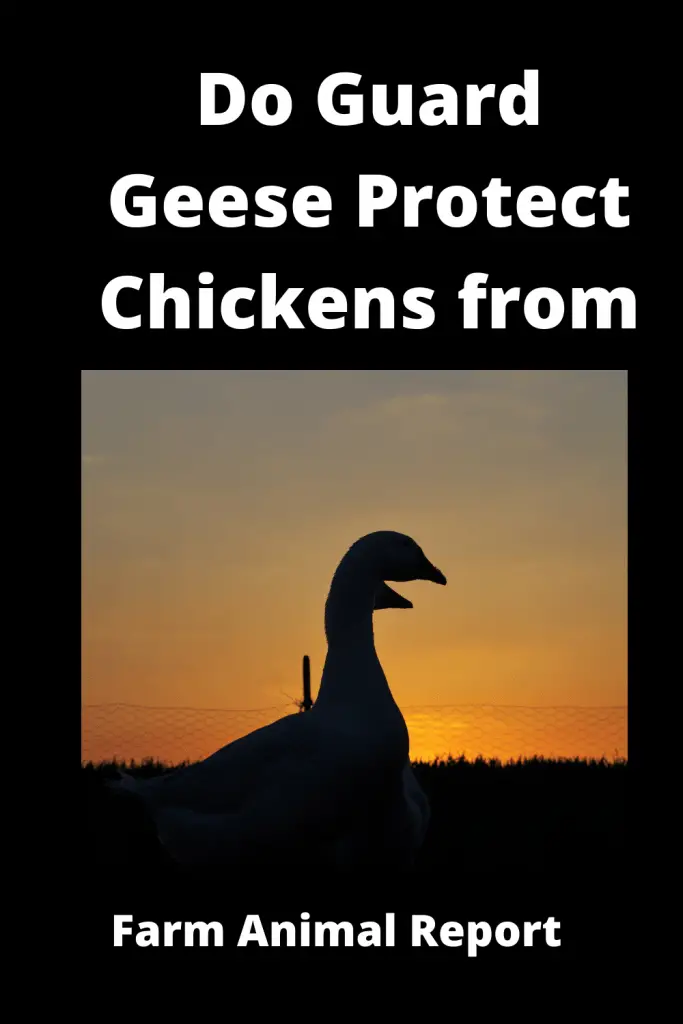
Introducing a Guardian Goose to Your Existing Flock
As goslings grow into adult geese, they instinctively become more territorial and assertive. Since protecting our egg producers is the primary goal, adding a goose that could harm them as an established adult would be counterproductive. For this reason, raising geese, into adult birds with your current flock members is highly recommended.
Goose will Imprint on Chickens
The goose will imprint on his or her feathered family and will take its role as a defender seriously. The gosling will also understand and recognize the farmer or human as a familiar presence and not as an intruder.
When looking to add geese as flock bodyguards it is certainly possible to add multiple geese and geese of varying domestic breeds. More than one goose on the farm or homestead will simply result in the creation of a separate flock.
One Goose or Many?
Geese will form their own family units or gaggles and will focus less on the backyard flock you’ve hired them to protect. One could also purchase a mated pair, however, it’s worth noting that the male goose will make guarding his female mate and her nest his top priority; the protection of the backyard flock of chickens or ducks is secondary.
While the mere presence of one or more geese at any location may be enough to deter some predators, a guardian gooses whose main focus is the backyard flock would, ideally, be a solo goose.
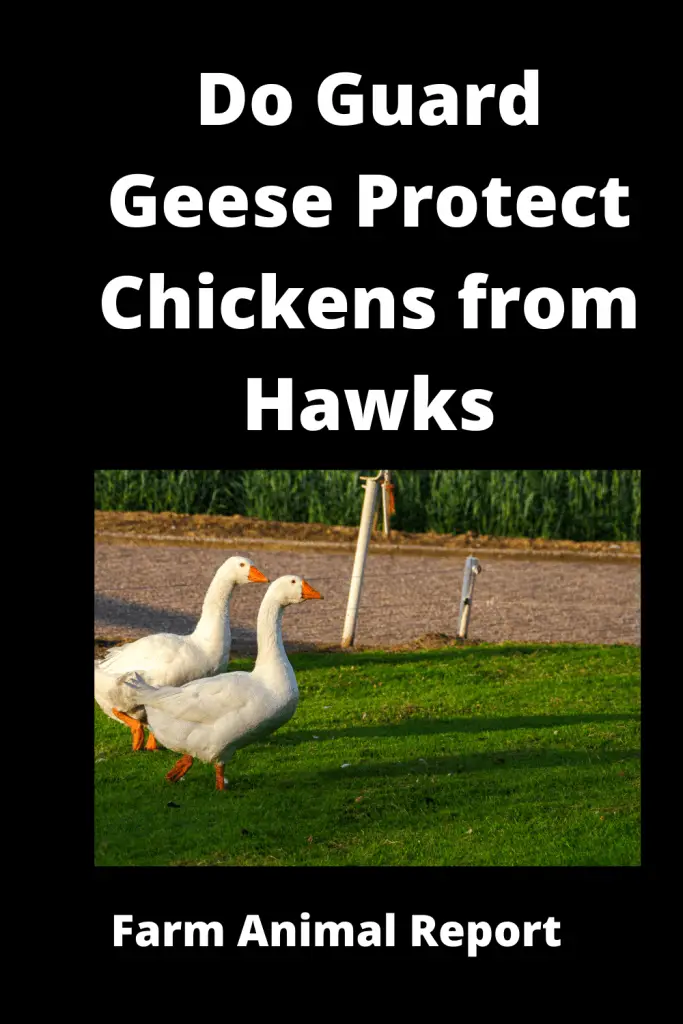
Predator Protection
Geese are not big enough to fend off the larger predators, such as coyotes or big cats, so they’re most effective when used in combination with good fencing. Geese can certainly fend off weasels, skunks, hawks, and other rodents, though, which will often prey on chickens or try sneaking eggs from your birds’ nests
. What a goose cannot defend your flock from they will still make plenty of noise about, allowing the alert farmer to investigate and protect their livestock.
While not always able to protect against them, geese are remarkable alarms when they see flying predators. An eagle or a hawk will immediately be noticed by a goose, long before human eyes would detect them against the sky. The resulting alarm will send chickens scurrying for safe cover.
Using a Single Guard Goose
Surprisingly, a single goose can often provide the best protection for a flock of chickens. If you raise multiple geese, they will bond with one another, and while they may deter potential predators, they will not actively work to protect your hens.
A single goose, especially if it’s raised with your chickens, will imprint on them and take their role as defender seriously.
One goose is also an inexpensive option to protect a flock of chickens because they are such easy keepers. A goose kept on healthy green grass needs only a little bit of supplemental feed.
Its main need is plenty of fresh drinking water in a deep trough so that it can keep its beak clean. If you’re protecting a flock of meat birds, a goose can be a nice addition to your freezer for a holiday meal, or it can continue to be a pet after the chickens have gone.
Using a Flock of Geese
A flock of geese will not be as attached to your chickens as a single goose would be. In fact, they usually could care less about the welfare of your hens, though this doesn’t make them as ineffective as guardians as you might think.
If you keep a full flock of geese on your farm, many predators will think twice before approaching. A gaggle of geese is an intimidating foe, even if they aren’t paying that much attention to guarding.
Chicken / Poultry Breeder Associations
| Rabbit Association | Location | Link |
|---|---|---|
| US Poultry & Egg Association | United States | USPA |
| American Poultry Association | California | APA |
| Ohio Poultry Association | Ohio | OPA |
| National Chicken Council | United States | NCC |
| British Poultry Council | United Kingdom | BPCE |
| Poultry Club of Great Britain | United Kingdom | PCGB |
| Association of Poultry Breeders in EU | Europe | AVEC |
| Australian Chicken Meat Federation Inc | Australia | ACMF |
| Australian Poultry Hub | Australia | Poultry Hub |
Will Geese Protect Chickens from Foxes?
There’s an old saying that you can’t keep a fox out of the henhouse. But what about a goose? That’s right – geese can actually help to protect chickens from foxes. Here’s how it works: geese are very flock-oriented creatures,and noisy poultry and they will do whatever it takes to protect their flockmates.
This includes attacking predators – like foxes – that try to enter the chicken coop. Geese are also much larger than chickens, so their presence can be enough to intimidate a fox into backing down. So if you’re looking for an extra layer of protection for your chickens, consider adding a goose or two to the flock. They just might save your chickens from becoming a fox’s next meal.


